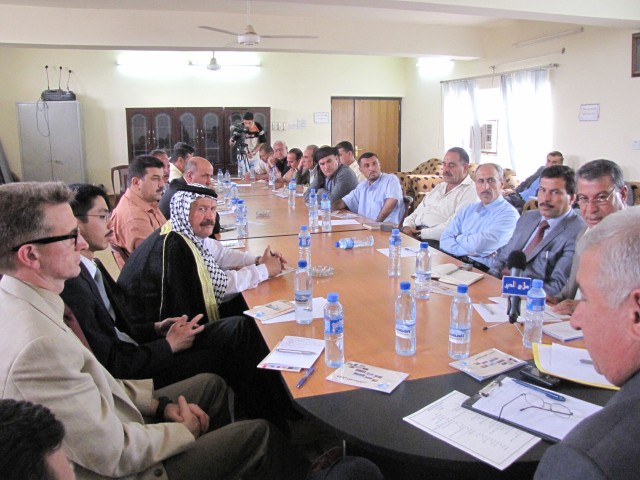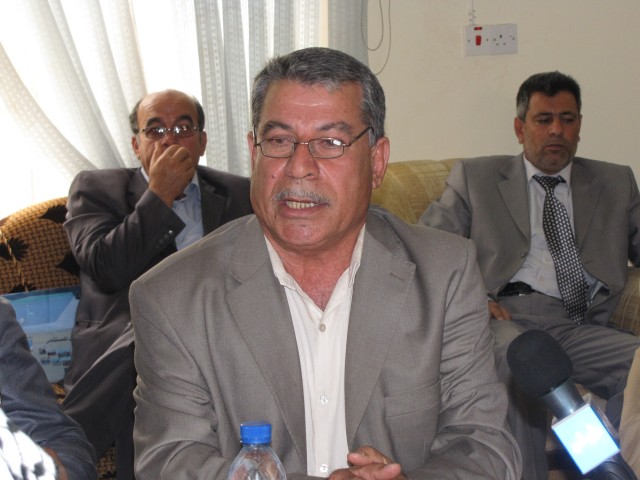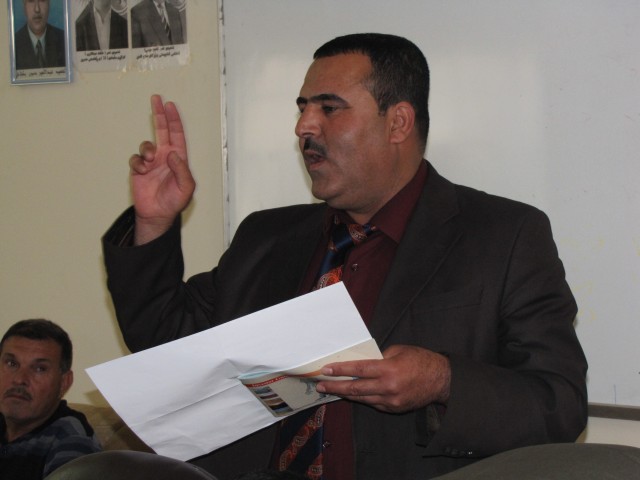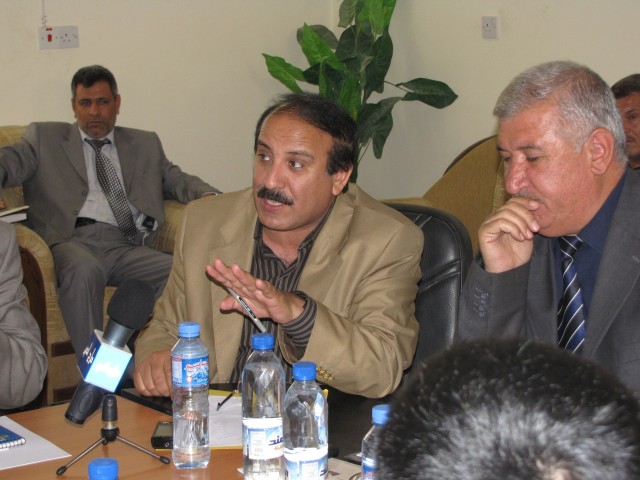FORWARD OPERATING BASE BERNSTEIN, TUZ, Iraq - The Salah ad-Din Provincial Investment Commission visited entrepreneurs from Tuz April 30 to discuss potential business partnerships which will further stimulate the city's economic growth and foster an even more stable security situation.
"We're here to place investments in Iraq in a strategic context," said Thomas Carpenter, a Senior Financial Economist working with the Provincial Reconstruction Team. "At some points in time, circumstances, events and forces - those which we control and those we don't control - compel us to action. Today is one such time."
"This area has been neglected since the time of the old regime," said Shalal al-Marhabi, a Tuz businessman. "What exactly can you do for us'"
Johar Fahad, Chairman of the Salah ad-Din Investment Office, outlined several easy steps that potential entrepreneurs can take in order to receive money from the Government of Iraq to start a new business.
"We are taking all the dust from the last regime off the faces of our people," said Johar, "and we can't allow our people to see things through narrow eyes any more."
The roundtable discussion included possible business ventures that the city of Tuz sorely needs - including privately-owned electric companies, wireless communications stores and tourist attractions.
"There are no hotels in Salah ad-Din," said Johar. "We can help you organize what you need in order to get the land, and at the same time we can help you get the money to build a hotel."
The group also discussed Iraq's natural resources and agreed that they should somehow be exploited.
"We want to build our cities and make use of all the land we have; we have so many resources. We're checking to see what raw materials are here, under Tuz, for mining purposes," said Johar.
Part of the PIC's mission is to keep politics, religion and business separate, which is a new idea to many Tuz citizens. Johar assured the assembly that no one from his office will ask an applicant his ethnicity, laying any uncertainties to rest.
"The bottom line: we don't mix personal business - including politics and religion - with economy," said Johar.
Carpenter, who organized the conference, also works closely with the al-Warka Bank in Iraq to help fund startup businesses. "With the way things are going in Tuz, there should be an al-Warka branch here within six months," said Carpenter. "They're trying to put 17 branches in the Salah ad-Din Province alone."
That itself speaks very highly of the security and stability of Tuz, according to City Council Chairman Qadir Ali Saleh. "There have been problems with security in the past, but they are almost gone now," said Qadir. "Investors coming to Tuz means that people think it is safe enough here."
Land rights have consistently been an issue for potential business owners throughout Iraq. Carpenter says that Iraq's Ministry of Finance owns up to 85% of the marketable land and the Department of Municipalities owns about 10%; that leaves a paltry 5% for the private sector.
Business owners can obtain leases from property owners, but historically land has been confiscated by the government. That leaves little certainty to a first-time capitalist.
"That's been the major constraint to growth in the whole economy," said Carpenter. "No one wants to start a business if the 'land carpet' can be pulled out from underneath them at any time."
Carpenter has already coordinated meetings between the PIC and local entrepreneurs in Bayji, Balad and Sharkat, and he is on his way to Samarra later this month.
"We'll evaluate where we are after we finish the Private Sector Financial Conference in Samarra. Our next emphasis is on some tutorials. Iraqis have the money; we have to show them how to take risks," said Carpenter.
The PRT will continue to work with the Investment Commission, entrepreneurs and banks until their mission is complete. An economically stable province will signal a new turn toward complete independence from outside interference for Salah ad-Din.
"We really had a socialist system before which was controlling us. Now we have the freedom to invest," said Johar. "Come to our department - we'll give you a stack of papers. Tell us the budget, we'll provide the land and the raw materials, and we'll connect you with investors."








Social Sharing